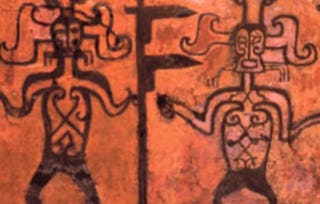This sequence of four courses will propose a multi-disciplinary approach to the study of Chinese cultural history conceived of as a succession of modes of rationality (philosophical, bureaucratic, and economic). The focus will be on the moments of paradigm shift from one mode of rationality to another. For each of these moments, cultural facts and artifacts—thought, literature, ritual—will be examined in relationship to changing social, political, and economic systems.

Religious Transformation in Early China: the Period of Division

Religious Transformation in Early China: the Period of Division

Instructor: Prof. John Lagerwey
3,904 already enrolled
Included with
(39 reviews)
Skills you'll gain
Details to know

Add to your LinkedIn profile
39 assignments
See how employees at top companies are mastering in-demand skills

There are 7 modules in this course
This module presents the relationship between the elite attack on shamanism and their promotion of a cosmology that transformed medicine and laid the foundations for both self-cultivation and a bureaucratic empire.
What's included
5 videos3 readings5 assignments
This module introduces the three kinds of new religious community that appear from the second century on: those organized around transcendents, by the Heavenly Masters, and by the Buddhists.
What's included
8 videos8 assignments
This module explains how Buddhist and Daoist rituals revolutionized Chinese society and individuals. It reveals the importance of orality in Buddhism, written documents in Daoism.
What's included
8 videos8 assignments
This module explores how Buddhist and Daoist scriptures confirm the oral/aural bias of Buddhism, the written/visual bias of Daoism. We are going to learn the centrality of logic in Buddhism, of cosmology in Daoism.
What's included
6 videos2 readings6 assignments
This module indicates the attractiveness of key Buddhist scriptures and how Chinese poetry was transformed by Buddhism. It also shows how the “public sermons” of Buddhism contrasted with the “private records of the imagination” of Daoism.
What's included
4 videos4 assignments
This module is about how Daoist sacred geography is above all an exploration of the inner self and how mountains played a role both in imperial preference for Daoism and in the Buddhist “conquest” of China.
What's included
6 videos1 reading6 assignments
This module illustrates why popular religion continued to thrive in spite of elite attacks on it, and how Buddhism and Daoism dealt with widespread fear of the spirits of the dead.
What's included
2 videos2 assignments
Instructor

Offered by
Explore more from History
 Status: Preview
Status: PreviewThe Chinese University of Hong Kong
 Status: Preview
Status: PreviewThe Chinese University of Hong Kong
 Status: Preview
Status: PreviewThe Chinese University of Hong Kong
 Status: Preview
Status: PreviewThe Hong Kong University of Science and Technology
Why people choose Coursera for their career

Felipe M.

Jennifer J.

Larry W.

Chaitanya A.
Learner reviews
- 5 stars
84.61%
- 4 stars
15.38%
- 3 stars
0%
- 2 stars
0%
- 1 star
0%
Showing 3 of 39
Reviewed on Jan 12, 2019
very informative, congenial instructor. Too many quizzes.
Reviewed on Jul 16, 2024
The course is challenging, in=depth, and insightful.
Reviewed on Dec 19, 2019
Excellent! After this course, I yield an proper understanding of the role of religions in the Period Of Division and of the mutual impact of them.

Open new doors with Coursera Plus
Unlimited access to 10,000+ world-class courses, hands-on projects, and job-ready certificate programs - all included in your subscription
Advance your career with an online degree
Earn a degree from world-class universities - 100% online
Join over 3,400 global companies that choose Coursera for Business
Upskill your employees to excel in the digital economy
Frequently asked questions
To access the course materials, assignments and to earn a Certificate, you will need to purchase the Certificate experience when you enroll in a course. You can try a Free Trial instead, or apply for Financial Aid. The course may offer 'Full Course, No Certificate' instead. This option lets you see all course materials, submit required assessments, and get a final grade. This also means that you will not be able to purchase a Certificate experience.
When you purchase a Certificate you get access to all course materials, including graded assignments. Upon completing the course, your electronic Certificate will be added to your Accomplishments page - from there, you can print your Certificate or add it to your LinkedIn profile.
Yes. In select learning programs, you can apply for financial aid or a scholarship if you can’t afford the enrollment fee. If fin aid or scholarship is available for your learning program selection, you’ll find a link to apply on the description page.
More questions
Financial aid available,

